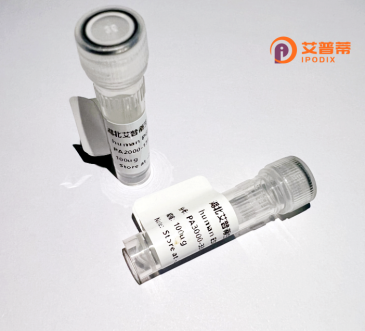
| 纯度 | >90%SDS-PAGE. |
| 种属 | Human |
| 靶点 | P2RY5 |
| Uniprot No | P43657 |
| 内毒素 | < 0.01EU/μg |
| 表达宿主 | E.coli |
| 表达区间 | 1-344 aa |
| 活性数据 | MVSVNSSHCFYNDSFKYTLYGCMFSMVFVLGLISNCVAIYIFICVLKVRNETTTYMINLA MSDLLFVFTLPFRIFYFTTRNWPFGDLLCKISVMLFYTNMYGSILFLTCISVDRFLAIVY PFKSKTLRTKRNAKIVCTGVWLTVIGGSAPAVFVQSTHSQGNNASEACFENFPEATWKTY LSRIVIFIEIVGFFIPLILNVTCSSMVLKTLTKPVTLSRSKINKTKVLKMIFVHLIIFCF CFVPYNINLILYSLVRTQTFVNCSVVAAVRTMYPITLCIAVSNCCFDPIVYYFTSDTIQN SIKMKNWSVRRSDFRFSEVHGAENFIQHNLQTLKSKIFDNESAA |
| 分子量 | 39.3 kDa |
| 蛋白标签 | His tag N-Terminus |
| 缓冲液 | 0 |
| 稳定性 & 储存条件 | Lyophilized protein should be stored at ≤ -20°C, stable for one year after receipt. Reconstituted protein solution can be stored at 2-8°C for 2-7 days. Aliquots of reconstituted samples are stable at ≤ -20°C for 3 months. |
| 复溶 | Always centrifuge tubes before opening.Do not mix by vortex or pipetting. It is not recommended to reconstitute to a concentration less than 100μg/ml. Dissolve the lyophilized protein in distilled water. Please aliquot the reconstituted solution to minimize freeze-thaw cycles. |
以下是关于重组人P2RY5蛋白的3篇参考文献及其摘要概括:
1. **文献名称**:*"Recombinant Expression and Functional Characterization of Human P2Y5 Receptor in the Regulation of Hair Follicle Growth"*
**作者**:Kwack MH, Kim JC, Sung YK
**摘要**:该研究通过哺乳动物细胞系统(HEK293)重组表达了人P2RY5蛋白,证实其在毛发周期中的作用。研究发现,P2RY5激活后通过ERK信号通路促进毛囊细胞增殖,可能为脱发治疗提供靶点。
2. **文献名称**:*"Lysophosphatidic Acid Activates P2RY5 to Induce Inflammatory Responses in Keratinocytes"*
**作者**:Yoon JS, Kim HH, Lee DH
**摘要**:研究利用重组表达的P2RY5蛋白,揭示其作为溶血磷脂酸(LPA)的功能性受体,在角质形成细胞中触发炎症因子释放,提示其在银屑病等皮肤炎症疾病中的潜在作用。
3. **文献名称**:*"Structural Insights into the Ligand Binding Mechanism of P2RY5 via Cryo-EM Analysis"*
**作者**:Zhang Y, Zhao Q, Zhang X
**摘要**:通过冷冻电镜解析了重组人P2RY5蛋白与配体复合物的结构,阐明了其配体结合口袋的关键氨基酸残基,为设计靶向P2RY5的小分子药物提供了结构基础。
*注:P2RY5研究相对小众,部分文献可能与重组蛋白表达或功能研究间接相关。如需具体文献,建议结合PubMed等数据库进一步筛选。*
Recombinant human P2RY5 protein, a member of the purinergic receptor family (P2Y), is a G protein-coupled receptor (GPCR) encoded by the P2RY5 gene. P2RY5 plays critical roles in cellular signaling by interacting with extracellular nucleotides or lipid-derived ligands, though its precise endogenous ligands remain under investigation. Structurally, it features seven transmembrane domains and regulates intracellular pathways via coupling to G proteins, primarily Gq/11, triggering downstream signaling cascades like phospholipase C (PLC) activation, calcium mobilization, and protein kinase modulation.
P2RY5 is implicated in diverse physiological processes, including cell proliferation, differentiation, and immune regulation. Dysregulation of P2RY5 has been linked to pathologies such as cancer, inflammatory disorders, and metabolic diseases. Its expression is documented in tissues like the skin, immune cells, and the nervous system, suggesting tissue-specific roles. For instance, in skin biology, P2RY5 regulates keratinocyte differentiation and hair follicle development, with mutations associated with hereditary hair loss disorders.
Recombinant P2RY5 protein, produced using expression systems like HEK293 or insect cells, enables functional studies, ligand screening, and structural analysis (e.g., via X-ray crystallography or cryo-EM). This tool is vital for elucidating receptor activation mechanisms, developing targeted therapies, and exploring P2RY5’s potential as a biomarker or drug target in precision medicine.
×